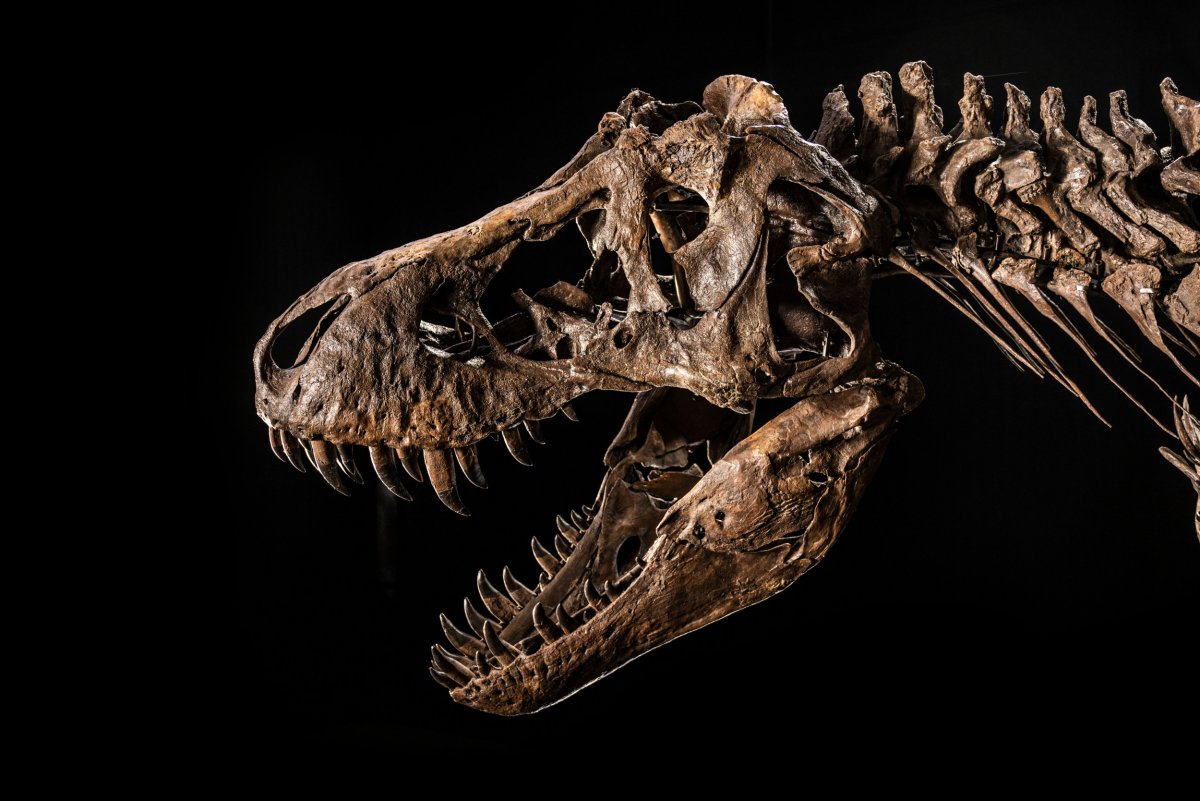A huge Tyrannosaurus rex skeleton is being sold at auction in November this year and is estimated to be bought for between $15 million and $25 million.
Shen the T. rex's skeleton auction in Hong Kong will mark the first time a T. rex skeleton has ever been sold in Asia. In the lead-up to the action on November 30, Shen will be available to view at the Victoria Theater & Concert Hall in Singapore, before being displayed and auctioned at the Hong Kong Convention and Exhibition Center. The skeleton measures 43ft long, 16ft high, and 7ft wide, and weighs around 3000 lbs.
Tyrannosaurus rex was a large species of theropod dinosaur that lived around 66 million years ago. Infamous for their huge teeth and tiny arms, T. rexes are some of the most well-loved species of dinosaur. Fewer than 20 T. rex skeletons exist in the world, most of which are incomplete.
Shen's skeleton was found in Hell Creek Formation in McCone County, Montana. It is 54 percent complete.

"From its surging, bloodthirsty stance, to its remarkable preservation, this is one of the most scientifically studied T. rex skeletons to come to auction," James Hyslop, Head of Science & Natural History at Christie's Hong Kong auction house, said in a statement. "After the unforgettable, record-breaking sale of STAN at Christie's New York in 2020, it is a thrill and an immense privilege for us to be trusted with the sale of another wonderous T. rex skeleton."
Many dinosaur skeletons have been sold at auction in the past, but scientists have not historically been supportive of dinosaur skeletons and other rare artifacts being sold.
"The problem with treating fossil specimens like trophies or collectibles is that their real significance comes from the information in the bones (from the obvious anatomical features to microscopic structures to even the isotopic composition of the molecules in the bone crystals), not from the object itself," Thomas R. Holtz, a principal lecturer in Vertebrate Paleontology at the University of Maryland, told Newsweek.
"Fossils which are in museum collections are in principle accessible to researchers now and into the future for analysis and study, including types of analyses and studies that we can't even imagine yet. Specimens which are privately owned are not so accessible, and even if they are now they might not be in the future," he said.
When a Gorgosaurus skeleton was sold by Sotheby's in July for $6 million, many experts spoke up about their concerns.
Gregory Erickson, a professor of paleobiology at Florida State University, told the BBC he fears that these million-dollar sales of dinosaurs "sends a message that it's just any other commodity that you can buy for money and not for scientific good."
Stan the T. rex specimen was sold by Christie's in 2020 for $31,800,000 in Abu Dhabi, making it the most expensive fossil ever sold.
"One very important part of scientific research is 'repeatability': the ability of independent researchers to examine the same materials and see if they come to the same (or different) conclusions as the first set of scientists," Holtz said.
"Specimens in private hands might be accessible to one set of scientists (perhaps friends of the rich person who buys it) but are not necessarily available to anyone else to check for themselves. So conclusions based on such specimens are really hearsay, not data."
According to Holtz, the scientific information in paleontology is not just the bones, it is also the position they are found in the rocks, the content of the sediment around them, and the exact level in the rocks in which it was found. The process of unearthing a fossil, therefore, requires a slow and precise investigation of all of these factors.
"Some commercial collectors just want to dig up fossils as trophies, so they don't bother to gather these data (and may even lack the professional expertise to know what data to collect)," he said.

The high price that these specimens are being sold prices out researchers, and also can lead to increased vandalism at paleontological sites due to robbers attempting to steal the increasingly valuable fossils.
Additionally, the terms of the sale state that the skeleton is "auctioned with full rights and all soft assets relating to it," meaning that the new owner of the fossils can theoretically do whatever they like with it. Depending on the person, that could mean they don't attempt to preserve the incredibly rare and scientifically crucial specimens.
"Not so much about the science but about one aspect of the private vs. public issue: a specimen bought by a millionaire/billionaire might only ever be seen by the rich person, their family, their servants, and their friends," Holtz said.
"Fossil specimens in museums might be put on display where everyone can see them. To be fair, most specimens in museums are behind the scenes in the collections. But in general, the more complete specimens wind up on display."
Uncommon Knowledge
Newsweek is committed to challenging conventional wisdom and finding connections in the search for common ground.
Newsweek is committed to challenging conventional wisdom and finding connections in the search for common ground.
About the writer
Jess Thomson is a Newsweek Science Reporter based in London UK. Her focus is reporting on science, technology and healthcare. ... Read more





